In 2022 the World’s 50 Best Restaurant organization recognized a diverse slate of altruists in the culinary space. I had the pleasure of interviewing two prior to the awards in London. First up: Chef Malonga.
Kigali, Rwanda based Chef Dieuveil Malonga is one of the recipients of the World’s 50 Best Restaurants 2022 Champion of Change award, which “recognises and celebrates unsung heroes of the hospitality sector who are driving meaningful action and creating blueprints for a better world.” Though he is deserving of this recognition, unsung is a stretch since accolades and attention are not new for Chef Malonga.
At 21 he participated in Top Chef Paris and is a two-time Forbes 30 under 30 honoree. Chef Malonga presented at the 4th United Nations World Tourism Organization’s Forum on Gastronomy Tourism and commanded UNESCO’s restaurant during Africa Week. In 2018 he was a finalist of the prestigious Basque Culinary World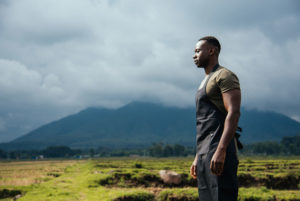 Prize, which celebrates chefs who demonstrates how gastronomy can have a positive impact in fields such as culinary innovation, health, the environment, social or economic development. His Kigali-based restaurant, MEZA Malonga has been hailed as one of the “world’s best restaurants” by Travel + Leisure and Food & Wine.
Prize, which celebrates chefs who demonstrates how gastronomy can have a positive impact in fields such as culinary innovation, health, the environment, social or economic development. His Kigali-based restaurant, MEZA Malonga has been hailed as one of the “world’s best restaurants” by Travel + Leisure and Food & Wine.
His origin story began in the Democratic Republic of the Congo. After losing his parents at an early age, fate took him to live in Germany at the age of 13, where he would begin his professional culinary journey and cut his teeth at two Michelin three-starred restaurants (Aqua and La Vie in Osnabrück, which has since closed) and one-starred Schote. Expanding his borders once again he traveled to Marseille, France to take part in the launch of the Intercontinental Hotel’s restaurant. The fact that Chef Malonga is only 30 means this is only the beginning.
I conducted a Zoom interview with Chef Malonga from Kingali. His positive energy and infectious smile represent all the good he is doing in the
What is Authentic African food?
Before the continent was not divided up into countries with borders; instead, there were many kingdoms that people traveled between. We can talk about Kingdom Cuisine because some of the same traditional recipes can be found in in Nigeria, Ghana, and Ivory Coast. To date I have traveled to over 48 Africa countries. Many with vastly different products and methods of cooking.
people traveled between. We can talk about Kingdom Cuisine because some of the same traditional recipes can be found in in Nigeria, Ghana, and Ivory Coast. To date I have traveled to over 48 Africa countries. Many with vastly different products and methods of cooking.
As a Black Fine Dining Enthusiast, I am often teased by my friends and family when I post photos of meals. They say it is pretty and rich people food. Can Soul or Africa-inspired cuisine be categorized as “Fine Dining”?
For the countries in Africa that I visit, what I do is go the villages to learn from the grandmothers. I take these recipes to my laboratory in Kigali and try to create something from the base. Many things in the recipe cannot change. We research new methods on how to serve or tell the story behind the dish.
Look at Ikoyi and MoSuke (Ikoyi is two-star London restaurant where the foundation of the “menu is a vast collection of spices with a focus on sub-Saharan West Africa”; MoSuke one-star Paris restaurant envisioned as “when African cuisine rubs shoulders with Japan, in a French aesthetic”). A restaurant does not have to serve foie gras or caviar to be fine dining.
The Farm-to-Table concept has become very trendy in the US over the past two decades for health and sustainability reasons. Has this always and continue to be the way of life or just life throughout Africa?
We knew that before. For many countries in Africa meat is eaten when they have a visitor or for celebrations. Otherwise, people eat vegetables. They have their own gardens or eat what is in the region. Even those with refrigerators prefer the old ways because it is healthier.
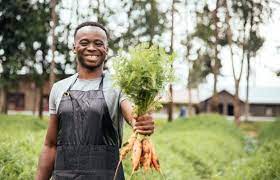 Villages have access to amazing organic product and they respect the region. Meaning if it is not mango season, they do not eat mangos. They have developed ways to do fermentation and conservation because most do not have electricity. This allowed me to discover more flavors and preparation methods.
Villages have access to amazing organic product and they respect the region. Meaning if it is not mango season, they do not eat mangos. They have developed ways to do fermentation and conservation because most do not have electricity. This allowed me to discover more flavors and preparation methods.
Though the global pandemic caused the closure of businesses and borders; the impact to Rwanda’s food supply was not drastic. We do not import many agricultural products. Due to its location in the center of Africa, Rwanda has an amazing climate and soil. I have two farms. During COVID I was able to concentrate on my lab and experiment with seasonal vegetables and welcome more local customers into my restaurant.
Shows, such as Netflix’s High on the Hog, have many Black Americans ready to explore Africa’s food scene. Any recommendations for food travelers?
Food does not have a borders. When traveling be open-minded. Food is education. If possible, go with the mindset to learn. Get over notions such as African food does not look good. Try street food and restaurants. The way to visit Africa is to share food. Go to the villages because this is where stories are told and you meet amazing people. More shows like High on the Hog are needed because we connect with ourselves through food. The same is true for South Africa, the Caribbean, and other places with large diaspora populations.
Dispel the rumor that Black restaurants have bad service.
Hospitality is based on the roots. Black restaurants and chefs must not force something just because it is done in Paris. You can receive a formal education on how to serve wine and food, but hospitality is who you are. People are coming to visit you. How are you welcoming them?
When in France I want to feel like I am in France. When in California I want to feel like I am in California. 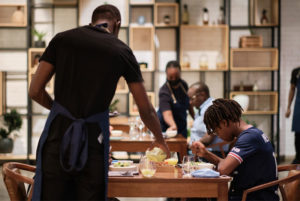 Everything cannot be the same. In China there is a restaurant that serves food with a drone. We must accept things are changing and people are recognizing who they are.
Everything cannot be the same. In China there is a restaurant that serves food with a drone. We must accept things are changing and people are recognizing who they are.
I cannot give the same service in Kigali as I would in Paris. In Kigali I welcome people, talk to them, touch them, ask about their family. If I don’t have a menu, I will give you what I have. This is working because who have bookings two months out. People are willing to pay a premium price.
You created the Chefs of Africa program. Tell us more about.
Chefs of Africa is an exchange program in which African cuisine is promoted and culinary ideas shared. Currently 70% of our chefs are from Africa and 30% are from the Caribbean, South America, and the US. We get many chefs from Jamaica especially.
The organization’s mission is twofold. First, we train chefs who have a passion for food, yet lack the funding to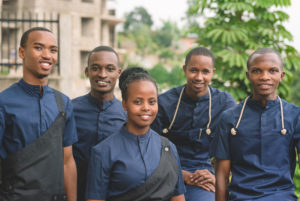 go to school. Masterclasses can be held online or in Kigali. Another program offered is residencies in select countries. Previously Ghana and the Ivory Coast were selected, and the chefs would go to villages. Chefs learned the local cuisine, as well as selecting a local product, cocoa in this instance, and exploring ways to use it in dishes. The next location is Madagascar where they will explore vanilla and learn about country’s cuisine.
go to school. Masterclasses can be held online or in Kigali. Another program offered is residencies in select countries. Previously Ghana and the Ivory Coast were selected, and the chefs would go to villages. Chefs learned the local cuisine, as well as selecting a local product, cocoa in this instance, and exploring ways to use it in dishes. The next location is Madagascar where they will explore vanilla and learn about country’s cuisine.
Secondly, we help connect these chefs with hospitality and restaurants looking for top talent. This includes helping them write a CV because some do not speak English or communicate only in their traditional languages.
What is the ideal time to visit Rwanda?
There June is a good time to visit Rwanda it is green and prior to the busy July tourist season. August there is a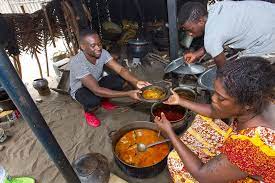 Since Rwanda is small I recommend travelers include Uganda, Kenya, Tanzania in their plans. Visit the villages because that Is where you will have the best experience and learn.
Since Rwanda is small I recommend travelers include Uganda, Kenya, Tanzania in their plans. Visit the villages because that Is where you will have the best experience and learn.
Parting words.
There is big change in the future for African fusion cuisine. We have to talk more about what we are doing. Other countries boast about their cuisine. We need to do the same.

